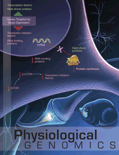
Physiological Genomics
Scope & Guideline
Pioneering Research at the Intersection of Genes and Physiology
Introduction
Aims and Scopes
- Genomic and Transcriptomic Analysis:
The journal frequently publishes research utilizing genomic and transcriptomic approaches to understand the molecular mechanisms underlying physiological processes, including muscle adaptation, metabolic responses, and disease mechanisms. - Physiological Responses to Environmental Changes:
Research often focuses on how organisms adapt to environmental stressors, including temperature changes, dietary variations, and hypoxia, revealing the genetic adaptations that support survival and homeostasis. - Microbiome and Host Interactions:
Studies frequently explore the role of microbiota in influencing host physiology, including immune responses, metabolic health, and disease susceptibility, highlighting the importance of host-microbiota interactions. - Comparative Physiology:
The journal encourages comparative studies across species to identify conserved and divergent physiological mechanisms, providing insights into evolutionary adaptations and species-specific traits. - Integrative Omics Approaches:
There is a strong emphasis on integrating various omics technologies (genomics, transcriptomics, proteomics, and metabolomics) to provide a holistic understanding of physiological phenomena.
Trending and Emerging
- Systems Biology Approaches:
There is a growing trend towards systems biology, integrating various omics data to understand complex physiological systems and their regulation, which is essential for comprehending multi-faceted biological responses. - Impact of Microbiome on Health:
Research focusing on the gut microbiome and its impact on metabolic health, immune function, and disease processes is rapidly increasing, highlighting the critical interplay between microbiota and host physiology. - Environmental and Stress Responses:
Emerging studies investigate how environmental changes (such as climate change) and stressors (like hypoxia and nutritional deficits) influence physiological adaptations at the genomic level. - Precision Medicine and Genomics:
There is a notable rise in research aimed at applying genomic insights to precision medicine, particularly in understanding individual variability in disease susceptibility and treatment responses. - Functional Genomics in Disease Models:
The use of functional genomics to dissect disease mechanisms and identify potential therapeutic targets is becoming increasingly prominent, especially in chronic diseases and conditions influenced by genetic factors.
Declining or Waning
- Traditional Genetic Studies:
There has been a noticeable decline in studies focusing solely on classical genetic approaches without integrating genomic technologies, as the field increasingly values comprehensive omics analyses. - Basic Physiological Mechanisms:
Research that solely investigates basic physiological mechanisms without a genomic or molecular context is becoming less common, as there is a clear trend towards studies that connect physiology with genomic insights. - Single-Factor Studies:
There is a waning interest in studies that examine single factors (e.g., one gene or one environmental stressor) in isolation, with more research now focusing on complex interactions and multifactorial analyses. - Animal Models with Limited Relevance:
The use of certain traditional animal models (e.g., less relevant rodent strains) for physiological studies is decreasing, as researchers seek models that more closely mimic human physiological conditions.
Similar Journals

Conservation Physiology
Unlocking the secrets of life to protect our planet.Conservation Physiology is a premier scholarly journal published by Oxford University Press, dedicated to advancing the understanding of physiological processes in the context of conservation and environmental science. Established in 2013 as an Open Access platform, it has rapidly gained recognition within the academic community, featuring research that spans various critical areas such as ecological modeling, management, monitoring, policy, and law. With its impressive impact in the field, Conservation Physiology holds a notable rank in Scopus and boasts quartile distinctions, reflecting its influence and contribution to Nature and Landscape Conservation. This journal serves as a vital resource for researchers, professionals, and students engaged in conservation efforts, providing them with a comprehensive understanding of how physiological insights inform effective conservation strategies and policies. Through its commitment to open access, Conservation Physiology ensures that vital research is readily available, fostering collaboration and innovation in the pursuit of global ecological sustainability.
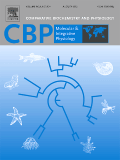
COMPARATIVE BIOCHEMISTRY AND PHYSIOLOGY A-MOLECULAR & INTEGRATIVE PHYSIOLOGY
Unveiling the Complexities of Biochemistry and Physiology.Comparative Biochemistry and Physiology A-Molecular & Integrative Physiology, published by Elsevier Science Inc, serves as a pivotal platform for cutting-edge research in the fields of biochemistry, physiology, and animal sciences. The journal, holding an esteemed presence with an ISSN of 1095-6433 and E-ISSN 1531-4332, spans a remarkable history of contributions since its inception in 1960, showcasing significant findings up to 2024. As a Q1 quartile journal in Animal Science and Zoology and featuring competitive rankings across various biochemistry and physiology disciplines, it stands out as a leading resource for both established researchers and emerging scholars alike. The journal is committed to publishing high-quality, peer-reviewed articles that deepen our understanding of molecular and integrative physiology, playing an essential role in advancing scientific knowledge and fostering interdisciplinary collaboration. With access options that prioritize the dissemination of impactful research, Comparative Biochemistry and Physiology continues to shape the dialogue within these dynamic fields.
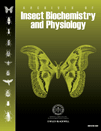
ARCHIVES OF INSECT BIOCHEMISTRY AND PHYSIOLOGY
Connecting Research and Practical Applications in EntomologyArchives of Insect Biochemistry and Physiology, an esteemed journal published by WILEY, stands at the forefront of advancing the understanding of insect physiology and biochemistry. With an ISSN of 0739-4462 and E-ISSN of 1520-6327, this journal serves as a critical resource for researchers and professionals in the fields of biochemistry, insect science, and physiology. As of 2023, it holds a respectable impact factor with a Q3 ranking in Biochemistry and Physiology, and a Q2 in Insect Science, highlighting its relevant contributions to these disciplines. The journal has maintained a continuous publication history from 1983 to 2024, hosting pioneering research and review articles that inform both academic and practical applications in entomology. While it does not currently offer open access, it is accessible through various institutional subscriptions, ensuring widespread availability of essential findings. This journal plays a vital role in elucidating the complex biochemical pathways and physiological adaptations of insects, fostering knowledge that is crucial for ecological research, agricultural development, and conservation efforts.

Physiological Reports
Empowering Knowledge in Physiology and Medical SciencePhysiological Reports is a pioneering open-access journal published by WILEY, dedicated to advancing the field of physiology through the dissemination of high-quality research. Since its inception in 2013, this journal has provided a platform for innovative studies in both general physiology and medical physiology, making significant contributions to our understanding of biological processes. With an impact factor that reflects its growing influence—as evidenced by its placement in the Q2 category for physiology and medical physiology in 2023—Physiological Reports is positioned as a vital resource for researchers and practitioners alike. The journal encourages the submission of diverse studies ranging from cellular mechanisms to systemic physiology, presenting a unique opportunity for authors to reach a global audience without access barriers. It has established a reputation for rigorous peer review and timely publication, ensuring that cutting-edge research is readily available to stimulate further inquiry and collaboration in the scientific community.

JOURNAL OF EVOLUTIONARY BIOCHEMISTRY AND PHYSIOLOGY
Bridging Evolutionary Theory and Biochemical InnovationJOURNAL OF EVOLUTIONARY BIOCHEMISTRY AND PHYSIOLOGY, published by PLEIADES PUBLISHING INC, is a pivotal periodical that delves into the intricate relationships between biochemical processes and evolutionary dynamics. With its ISSN 0022-0930 and E-ISSN 1608-3202, this journal serves as a comprehensive platform for researchers, professionals, and students dedicated to understanding the physiological adaptations and biochemical mechanisms influenced by evolutionary pressures. Although it is not an open access journal, it offers valuable insights across its historically significant coverage spanning from 1972 to 2017, making it an essential resource for those working in agricultural, biological, and molecular sciences. Despite its current Scopus rankings revealing limited visibility within its fields, the journal remains committed to fostering scholarly dialogue and advancing knowledge in the realm of evolutionary biochemistry, especially for those exploring the ecological, genetic, and integrative physiological aspects of life.
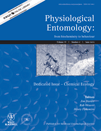
PHYSIOLOGICAL ENTOMOLOGY
Decoding the Dynamics of Insect BehaviorPHYSIOLOGICAL ENTOMOLOGY is a prestigious journal published by WILEY, focusing on the intricate relationships between physiological processes and the ecological and evolutionary dynamics of insects. With an ISSN of 0307-6962 and E-ISSN of 1365-3032, this journal has been at the forefront of insect science since its inception in 1976, contributing significantly to the understanding of insect physiology and behavior. The journal has established itself within the academic community, currently holding a position in the Q2 quartile for both Ecology, Evolution, Behavior and Systematics and Insect Science, highlighting its relevance and impact in these fields. Although there are no Open Access options available, researchers and practitioners can rely on its regular publications to stay abreast of pivotal discoveries and methodologies in insect physiology. With a commitment to advancing the field through rigorous peer-reviewed research, PHYSIOLOGICAL ENTOMOLOGY serves as an essential resource for researchers, professionals, and students alike.

JOURNAL OF COMPARATIVE PHYSIOLOGY A-NEUROETHOLOGY SENSORY NEURAL AND BEHAVIORAL PHYSIOLOGY
Charting New Territories in Sensory Neural ResearchJOURNAL OF COMPARATIVE PHYSIOLOGY A-NEUROETHOLOGY SENSORY NEURAL AND BEHAVIORAL PHYSIOLOGY, published by Springer Heidelberg, is a leading journal in the fields of animal science and zoology, providing vital insights into the neuroethology, sensory processing, and behavioral physiology of various species. With an impressive H-index, the journal has established itself as a credible source of high-quality research since its inception in 1974, maintaining relevance through to 2024. Recognized for its rigorous editorial standards, the journal is categorized in the Q1 rank for Animal Science and Zoology, Q3 in Behavioral Neuroscience, and boasts competitive rankings across several other disciplines, indicating its broad impact within the scientific community. While the journal is currently not open access, its articles can be crucial for advancing knowledge in comparative physiology and fostering interdisciplinary discussions among researchers, professionals, and students alike. By publishing original research, reviews, and critical commentaries, the journal continues to be a cornerstone for those exploring the intricate connections between neural mechanisms and behavioral adaptations.

BIOLOGIA PLANTARUM
Fostering Collaboration in Plant Science ExcellenceBIOLOGIA PLANTARUM, esteemed within the realms of horticulture and plant science, is a leading academic journal published by the Academy of Sciences of the Czech Republic, Institute of Experimental Botany. Established in 1959, this journal showcases innovative research and advancements in plant biology, focusing on a spectrum of topics including plant physiology, genetics, and biotechnology. With an impressive Scopus ranking in Horticulture (Rank #41/115) and Plant Science (Rank #221/516), it holds a significant place in the academic community, reflected in its Q2 and Q3 status within its respective categories. Although it is not open access, authors are encouraged to contribute to the growing body of knowledge that supports sustainable practices in agriculture and horticulture. Published in the Netherlands, BIOLOGIA PLANTARUM continues to foster collaboration and dialogue among researchers, professionals, and students dedicated to understanding and advancing plant sciences.
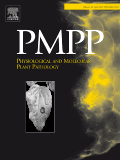
PHYSIOLOGICAL AND MOLECULAR PLANT PATHOLOGY
Innovating solutions for a sustainable agricultural future.Physiological and Molecular Plant Pathology is a leading journal published by Academic Press Ltd - Elsevier Science Ltd, dedicated to advancing our understanding of plant diseases through the synthesis of physiological and molecular perspectives. With an ISSN of 0885-5765, this esteemed journal has been a cornerstone in the field since its inception in 1986 and continues to publish critical research findings up to 2024. Notably, it holds a strong reputation in Plant Science, ranked Q2, and genetics, ranked Q3, reflecting its impactful contributions to these important areas of study. The journal is recognized within Scopus, achieving a ranking of 151 out of 516 in Plant Science, positioning it within the 70th percentile, making it a vital resource for researchers and students alike. While it is not an open-access journal, the insights provided in each issue are invaluable for those dedicated to understanding the complexities of plant pathology and enhancing agricultural resilience. Researchers, professionals, and students in the field are encouraged to explore and contribute to this pivotal journal, which plays a crucial role in driving innovation and discovery in plant health sciences.

Journal of Comparative Physiology B-Biochemical Systems and Environmental Physiology
Pioneering Research at the Intersection of Life SciencesJournal of Comparative Physiology B-Biochemical Systems and Environmental Physiology, published by SPRINGER HEIDELBERG in Germany, stands at the forefront of research in the fields of physiology, biochemistry, and ecological systems. With a commitment to fostering interdisciplinary communication, this journal has been a vital resource since its inception in 1974, converging scientific exploration through the lens of biochemical mechanisms and environmental adaptations in animal systems. Renowned for its rigorous peer-review process, it has achieved impressive rankings, including Q2 in Animal Science and Zoology and Ecology, Evolution, Behavior and Systematics, reflecting its substantial impact within these disciplines. The journal aims to disseminate cutting-edge research that advances our understanding of physiological and biochemical processes while addressing contemporary environmental challenges. While currently operating on a traditional access model, the journal's contributions are crucial for researchers, professionals, and students seeking profound insights into the complex interactions between organisms and their environments.